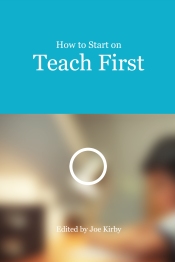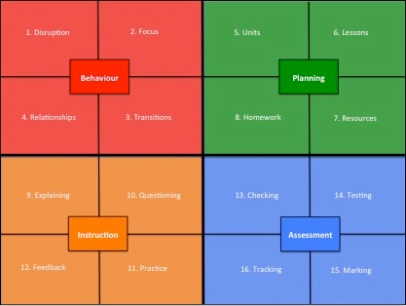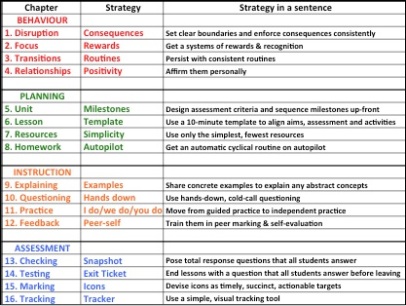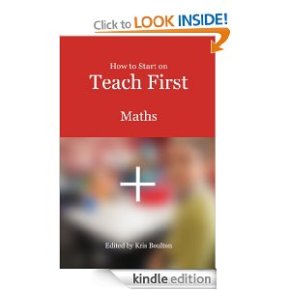Every year, new Teach First participants reinvent the wheel: that is, they often plan and resource 20 or more new lessons a week. Despite ten years of entering classrooms, there is no systematic sharing of our best ideas, examples and resources on how to plan, resource and teach in challenging schools. At best, teachers in schools share piecemeal resources with incoming participants. Huge amounts of institutional knowledge, capacity and know-how have never been shared or stored, but lost. Never shared, that is, until now.
After 12 months of Saturday meetings, with teachers in their first and second and third and sixth years showing unbelievable commitment to the cause, some waking up at 4am, travelling down to London from around the country, from Manchester and Birmingham and Newcastle, we are ready to share our ideas.

We made a few decisions early on that shaped the book. We’d open it up and try and get 50 teachers involved in contributing. None of the authors would take any profits; any proceeds would all go back to Teach First. We wouldn’t write about theory, research or educationalists. We wouldn’t include high-level strategies or micro-technical tips and tricks.
Instead, we’d focus only on the burning questions that all new teachers need to answer. We’d only give tried-and-tested solutions. We’d include lots of anecdotal stories as to how we’d made the ideas work. And we’d share the best practical resources we had between us to take away and use from day one. We wanted every word to be as practical, concise, precise and useful as possible. And we’d ask headteachers to read it, and if they liked it, endorse it. So here’s a just little bit of what some of them said:
“Some of the stories are gold dust!”
“If you only read one book before September, read this one!”
“ I strongly recommend all Teach First trainees read this book”.
The result is not silver bullets, secret ingredients or magic formulae, but 16 tried-and-tested strategies for starting out when teaching in tough schools. It is a starting point, not an end point. Spanning NQT teachers and experienced heads of departments, the 50 or so of us who’ve ended up contributing have found it useful in improving our practice. We hope you will too.
So what makes this book different then?
Each chapter:
- focuses on one practical, burning question.
- suggests the one top strategy out of several options we considered.
- clarifies how it looks when it’s not working and what success looks like.
- answers a series of sub-questions like: ‘how do I make it work?’ and ‘but what if…’
- shares three anecdotes of how teachers made the strategy work in their classroom.
- takes its place as part of a distinctive, cohesive overview of effective teaching.
This overview was hotly contested between the co-writers but emerged after much debate as an interlinked but powerful overview of the 16 priorities for starting in teaching:

The idea behind all of this is to contribute to helping new teachers starting in tough schools hit the ground running from day one.

The beauty of digital publishing is that it’s always evolving. So we’ll be adapting this book and its stories. Please feel free to send in any ideas and anecdotes that you feel would improve the book, as we look to publish in print next year.
Some logistics
If you don’t have a Kindle, you can simply download the Kindle app on iphones, ipads, macs, pcs and android smartphones.
Shout-Outs
- Kris Boulton for starting the blog in the first place, having the faith to turn it into an ebook, and for writing and editing the upcoming Maths edition!
- Katie Ashford for unrelenting relentlessness on the knowledge grids and making sure Maths wasn’t too theoretical and English wasn’t hijacked!
- Bodil Isaksen for keeping us both banterous and grounded in the first year reality
- Jo O Rourke for her inspiring energy and Gearoid O Rourke and his excellent design advice
- Hannah Obertelli for the idea to contextualise the anecdotes, lending us her flat for a planning session and awesome input throughout
- Zahra Dharsi for tireless dedication on the English knowledge grids
- Bruno Reddy for juggling a family and leading KSA’s Maths department with this project
- Matt Lloyd for convincing us to involve so many other people
- Briar Lipson for coming up with idea for a practical handbook rather than policy paper
- Ciaran McCaughey for the brilliant idea of clearly setting out what success looks like
- Lorenzo McClellan for great resources, ideas putting us in touch with publishers
- Edison Huyhnh, Tamsin Grainger, Verena Hefti, Sam Sampson for the strategic questioning that helped guide the project
- Reuben Moore for being an honest, direct, critical and constructive friend within Teach First
- Sam Freedman for putting us in touch with the Teacher Development Trust
- David Weston for excellent quality assurance and robust feedback
- Jemma South for constant support and advice
- Alex Blanc for the front covers, content conversion and brilliant design – entirely pro bono!
- Ruth Carney for proofreading the entire English ebook
- Ed Vainker and Max Haimendorf for reading the book and writing endorsements whilst full time Head Teachers
- Bex Cramer for her inspiring positivity and belief in us as young teachers
- David Didau for sharing the idea of ‘zoom in’ and ‘zoom out’ for analysing language
- Rosie Jahangard for inspiring me to start this blog in the very first place!
If I’ve forgotten anyone then please let me know and I’ll add them in! The dedication shown by everyone who has made this happen while teaching full-time is inspiring to me.




